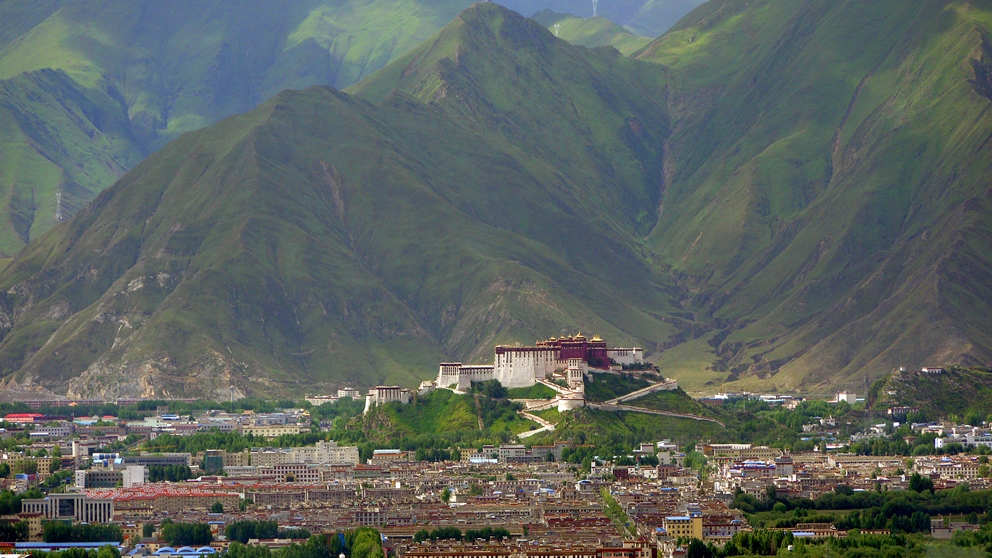
Overview:
We'll begin in Chengdu, one of China's most exciting and
progressive cities. Our journey ends in Nepal's ancient city of
Kathmandu, nestled at 4600 feet in the Himalayan foothills. In between,
we visit Lhasa home of the exquisite Jokhang temple and majestic Potala
Palace, Gyantse, Shigatse, Everest Base Camp and then take the rough,
twisting road down into Kathmandu.
Distinct from a luxury vacation or sightseeing tour, our journey is
meant as an immersion into the Buddhist worldview, a contemplative
pilgrimage - providing an 'opportunity of a lifetime' to connect
directly with the Tibetan tradition. Throughout our journey, we will
experience Tibet's culture as we explore the variety of ways in which
Buddhist practitioners express themselves. Prepare to enter the stream
of countless pilgrims who have traveled to Lhasa over hundreds of years
to circumambulate, pray, meditate, make offerings, and receive blessings
at these venerated monuments imbued with power and meaning.
This pilgrimage is being coordinated by Effie Fletcher of Himalayan High
Treks on behalf of Michael Gregory and the Mindfulness Meditation Centers.
 Leadership: Michael Gregory
is the Director of Mindfulness Meditation
Centers throughout the US. He has led hundreds of meditation retreats on
almost every subject matter related to Dharma, in addition to leading
meditative pilgrimages throughout Thailand, Tibet, Bhutan, Nepal, and
India. Michael was ordained as a monk in the Thai Forest tradition, the
Burmese Mahasi tradition, and then was ordained in the Tibetan tradition
by H.E. Gylatsab Rinpoche at Rumtek monastery in Sikkim. He has
practiced in the Thai Forest tradition of Ajahn Chah, the Anapanasati
tradition of Buddhadassa Bhikku, and the Jhana traditions of Mahasi
Sayadaw and Pa Auk, as well as having extensive experience in the Tibetan
tradition. Leadership: Michael Gregory
is the Director of Mindfulness Meditation
Centers throughout the US. He has led hundreds of meditation retreats on
almost every subject matter related to Dharma, in addition to leading
meditative pilgrimages throughout Thailand, Tibet, Bhutan, Nepal, and
India. Michael was ordained as a monk in the Thai Forest tradition, the
Burmese Mahasi tradition, and then was ordained in the Tibetan tradition
by H.E. Gylatsab Rinpoche at Rumtek monastery in Sikkim. He has
practiced in the Thai Forest tradition of Ajahn Chah, the Anapanasati
tradition of Buddhadassa Bhikku, and the Jhana traditions of Mahasi
Sayadaw and Pa Auk, as well as having extensive experience in the Tibetan
tradition.
Michael is appreciated for a teaching style that de-centralizes the role
of a guru, institutional spirituality, as well as the usage of rites and
rituals. He encourages every being to empower themselves by finding the
pure and unlimited potential of this very moment.
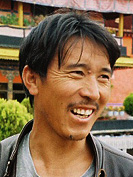 Tibet Guide: Pemba Tashi
is HHT's principal Tibetan trekking and
pilgrimage guide. His extensive mountain and trail experience combines
with his easy humor and an ability to help explain many complex cultural
and Buddhist-oriented subjects to travelers. He is an ideal interpreter
of this ancient and fascinating mountain region.
Tibet Guide: Pemba Tashi
is HHT's principal Tibetan trekking and
pilgrimage guide. His extensive mountain and trail experience combines
with his easy humor and an ability to help explain many complex cultural
and Buddhist-oriented subjects to travelers. He is an ideal interpreter
of this ancient and fascinating mountain region.
Mindfulness Meditation Pilgrimage • Day–To–Day Itinerary Detail:
Pre Trip Days:
Pre-trip Days: Fly to our meeting point in Chengdu, China. Travelers
from the Americas 'lose' one day crossing the international date line.
If you wish to arrive early, we can arrange an early airport transfer
and accommodations with advance notice. Please note that you must arrive
in Chengdu, China by September 8, 2019.
Day 1 (September 8, 2019):
Group arrival day in Chengdu, China. Our
staff will wait for your arrival outside the secured area of the Chengdu
Shuangliu International Airport - after you collect your luggage and
proceed through China customs. Look for our guide holding a sign that
says "Himalayan High Treks." You will transfer to your hotel for check-in.
Chengdu, at only 1,640 feet of altitude, is the capital of the Sichuan
province, located in southwest China. It's known as the 'land of
abundance', the hometown of the Giant Panda, the city of Brocade, and
Sichuan cuisine.
You'll enjoy an early dinner at an excellent Sichuan restaurant and
catch-up on your rest after your long travel to China. Overnight at
Tibet Hotel, Chengdu. (Dinner)

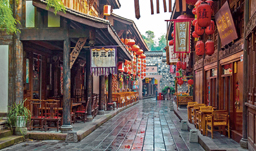 Day 2 (September 9, 2019):
Following breakfast, enjoy a full day in
Chengdu. We first visit the world's largest park for the giant panda -
with more than 150 giant pandas. It is a 40-minute drive to reach the
park, located in the north side of the city. Enjoy two to three hours at
the center, strolling through its bamboo forest, with an early lunch at
a Sichuan hotpot restaurant.
Day 2 (September 9, 2019):
Following breakfast, enjoy a full day in
Chengdu. We first visit the world's largest park for the giant panda -
with more than 150 giant pandas. It is a 40-minute drive to reach the
park, located in the north side of the city. Enjoy two to three hours at
the center, strolling through its bamboo forest, with an early lunch at
a Sichuan hotpot restaurant.
Wenshu Temple (also called Manjushri Temple) is one of China's
most-famous and best-preserved Buddhist temples. It is found in a unique
place in downtown where people relax in their spiritual world within a
solemn and holy place.
We also walk through city streets to visit People's Park for a glimpse
of Chengdu's daily life. Enjoy a local Tai Chi class. After an early
dinner, enjoy an evening at the Shufeng Yayun Teahouse. Arrive early (by
about 7:30) for the 8:00 p.m. show, a one-of-a-kind cultural performance
including acrobats, dancers, and puppets that continues for an hour and
a half before we return to the hotel for another early night. Overnight
at Tibet Hotel, Chengdu. (Breakfast, Lunch, Dinner)
Day 3 (September 10, 2019):
Today after breakfast we will transfer to
the airport and fly to Lhasa Gonggar Airport, located at 11,713 feet -
over 10,000 feet higher than Chengdu. Your acclimatization begins upon
arrival! Our flight time should be about 2.5 hours. We will be met on
arrival to transfer 50 miles in about one hour to our hotel and
check-in. You will have free time to rest or explore before dinner. The
hotel is in the middle of the city and centrally located so taking a
walk around is a good possibility just don't overdo it. Ideally, you
should drink lots of fluid and rest. Overnight Tsetang Hotel
(four-star) at 10,170 ft. (Breakfast, Dinner)
Day 4 (September 11, 2019):
Our first days at high altitude will involve
only gentle touring and exploration. First, we visit Tsedang and then
continue with a scenic drive to the first monastery in Tibet-Samye
Monastery. Continue on to Lhasa (11,995 ft) with a total drive time of
three to four hours and check in at Shangri-La Hotel (five-star) and
later enjoy a special buffet dinner at the hotel. (Breakfast, Lunch, Dinner)
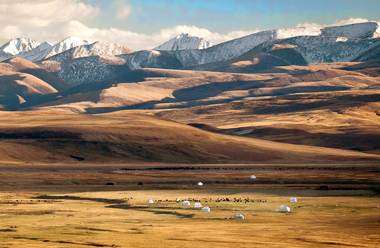 Day 5 (September 12, 2019):
After breakfast this morning, we will visit
Drepung Monastery (literally "Rice Heap" Monastery). Drepung is the
largest of all Tibetan monasteries and is located on the Gambo Utse
mountain, five kilometers from Lhasa. It was founded in 1416 by Jamyang
Choge Tashi Palden (1397-1449). It was known for the high standards of
its academic study and was called the Nalanda of Tibet, a reference to
the great Buddhist monastic university of India.
Day 5 (September 12, 2019):
After breakfast this morning, we will visit
Drepung Monastery (literally "Rice Heap" Monastery). Drepung is the
largest of all Tibetan monasteries and is located on the Gambo Utse
mountain, five kilometers from Lhasa. It was founded in 1416 by Jamyang
Choge Tashi Palden (1397-1449). It was known for the high standards of
its academic study and was called the Nalanda of Tibet, a reference to
the great Buddhist monastic university of India.
After lunch, we visit the Sera Monastery ("Wild Roses Monastery"). It is
one of the "great three" Gelug University monasteries of Tibet, found
two kilometers north of Lhasa. Sera Monastery is a complex of structures
with the Great Assembly Hall and three colleges, founded in 1419 by
Jamchen Chojey (1355-1435). During the 1959 revolt in Lhasa, Sera
Monastery suffered severe damage but was later restored. In 2011,
according to local sources, there were about 300 monks in residence. We
later return to our hotel with dinner on your own. Overnight Shangri-La
Hotel. (Breakfast, Lunch, Dinner)
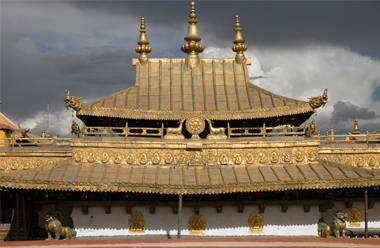 Day 6 (September 13, 2019):
Today we explore Lhasa including the Jokhang
Temple and the majestic 13-story, 1,000-room Potala Palace. Tibetans, in
general, consider Jokhang Temple as the most sacred and important temple
in Tibet. Jokhang is run by the Gelug school, but worshipers from all
Buddhist sects visit the temple. The oldest part of the temple was built
in 652 by Songtsen Gampo. During the Cultural Revolution in 1966, Red
Guards attacked the Jokhang and for a decade there was no worship in
Tibetan monasteries. Renovation of the Jokhang began in 1972 and was
mostly complete by 1980. Its architectural style is a mixture of Indian,
Tibetan, and Nepalese design.
Day 6 (September 13, 2019):
Today we explore Lhasa including the Jokhang
Temple and the majestic 13-story, 1,000-room Potala Palace. Tibetans, in
general, consider Jokhang Temple as the most sacred and important temple
in Tibet. Jokhang is run by the Gelug school, but worshipers from all
Buddhist sects visit the temple. The oldest part of the temple was built
in 652 by Songtsen Gampo. During the Cultural Revolution in 1966, Red
Guards attacked the Jokhang and for a decade there was no worship in
Tibetan monasteries. Renovation of the Jokhang began in 1972 and was
mostly complete by 1980. Its architectural style is a mixture of Indian,
Tibetan, and Nepalese design.
Potala Palace is named after Mount Potalaka, the mythical abode of the
bodhisattva Avalokitesvara. The 5th Dalai Lama started its construction
in 1645 after one of his spiritual advisers, Konchog Chophel, suggested
that the site was ideal as a seat of government - situated as it is
between Drepung and Sera monasteries and the old city of Lhasa. It is
thought to overlay the remains of an earlier fortress called the White
or Red Palace, built by Songtsan Gampo in 637. The external structure
was built in three years, while the interior, together with its
furnishings, took 45 years to complete. The Potala Palace became a
UNESCO World Heritage Site in 1994. Overnight Shangri-La
Hotel. (Breakfast, Lunch, Dinner)
  Day 7 (September 14, 2019):
Day trip to Drigung Thil (14, 649 feet)
about 75 miles north-east of Lhasa. Founded in 1179 traditionally
Drigung Thil Monastery was the main seat of the Drikung Kagyu tradition
of Tibetan Buddhism. The monastery was destroyed in 1959 but has been
partially rebuilt. Approximately 250 monks are in residence. Note: the
monastery can be visited for sure but the burial site cannot be
guaranteed as it depends on local permission. We will try our best to
include it. It is said that bodies dispatched here will not fall down
into the “ three bad regions." Drive back to Lhasa and overnight
Shangri-La Hotel (Breakfast, Lunch, Dinner)
Day 7 (September 14, 2019):
Day trip to Drigung Thil (14, 649 feet)
about 75 miles north-east of Lhasa. Founded in 1179 traditionally
Drigung Thil Monastery was the main seat of the Drikung Kagyu tradition
of Tibetan Buddhism. The monastery was destroyed in 1959 but has been
partially rebuilt. Approximately 250 monks are in residence. Note: the
monastery can be visited for sure but the burial site cannot be
guaranteed as it depends on local permission. We will try our best to
include it. It is said that bodies dispatched here will not fall down
into the “ three bad regions." Drive back to Lhasa and overnight
Shangri-La Hotel (Breakfast, Lunch, Dinner)
Day 8 (September 15, 2019):
This morning after breakfast we will drive
about four hours to Gyantse. On the way, we'll stop at Yamdrok Lake (at
14,570 feet), one of the three large sacred lakes in Tibet. It is over
45 miles long and surrounded by snow-capped mountains. According to
local mythology, Yamdok Yumtso Lake is the transformation of a goddess.
Around 56 miles to the west of the lake lies the Tibetan town of
Gyantse. We then visit the visit Phalkhor monastery and the Kumbum
Stupa, designed by Newari architects from Nepal. The Phalkhor has a
special influence over Buddhism in Tibet, owing to its unity of Gelugpa,
Sakyapa and Bhutan sects. The Kumbum is truly incredible.
Gyantse Dzong (or Gyantse Fortress) is one of Tibet's best-preserved
dzongs, perched high above Gyantse on a huge outcrop of grey-brown rock.
The fortress was constructed in 1390 to guard the southern approaches to
the Tsangpo Valley and Lhasa. The town was surrounded by a wall almost
two miles long, with an entrance on its eastern side. After our visit we
check-in at our hotel for overnight and enjoy dinner. Overnight Gyantse
Hotel (Breakfast, Lunch, Dinner)

Day 9 (September 16, 2019):
Today after breakfast, we drive first to
Shalu Monastery founded in 1040 by Chetsun Sherab Jungnay. For centuries
it was renowned as a center of scholarly learning and is still known for
its wonderful mural paintings, considered to be the most ancient and
beautiful in Tibet. Shalu was the first of the major monasteries to be
built by noble families of the Tsangpa during Tibet's great revival
of Buddhism and was an important center of the Sakya tradition. Continue
about an hour to Shigatse (12,800 feet). The Tashi Lhunpo Monastery was
founded in 1447 by the 1st Dalai Lama and is a historic and culturally
important monastery in Shigatse, the second-largest city in Tibet. The
monastery was sacked when the Gorkhas invaded Tibet and captured
Shigatse in 1791 before a combined Tibetan and Chinese army drove them
back to the outskirts of Kathmandu, Nepal. Located on a hill in the city
center, the full monastery name in Tibetan means "all fortune and
happiness gathered here" or "heap of glory."
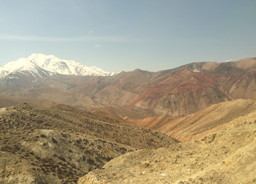
Tashi Lhunpo founder Gedum Drup was later recognized as the first Dalai
Lama. The main statue of this monastery is the Maitreya Buddha made from
600 pounds of gold and measuring eight feet in height. It at one time
housed over 4,000 monks and had four Tantric colleges each with its own
Abbot. In 1960, the monastery was dismantled by the Chinese army,
although less damage was inflicted on this monastery than on others
around Tibet. During the 1960s, many senior lamas and monastics left
Tibet and helped re-establish monasteries in India, Nepal and Bhutan.
The late Panchen Lama did not leave Tibet and consequently many of the
senior lamas from Tashi Lhunpo Monastery remained inside Tibet.
A Ngang morning chanting ceremony accompanied by sacred musical
instruments is led by the few remaining monks of the temple. Pilgrims
may circumambulate the hall but travelers and photographers should be
extremely sensitive to the sacred atmosphere. We will check-in st our
hotel and enjoy dinner. Overnight Tashi Choeda Hotel (Breakfast, Lunch,
Dinner)
Day 10 (September 17, 2019):
Drive to Shegar via Sakya Monastery and
Gyatso La Pass the highest point on your trip at 17218 ft. After driving
about 90 miles in three hours we reach the monastery. It is the seat of
the Sakya (or Sakyapa) school of Tibetan Buddhism founded in 1073,
by Konchok Gyelpo. Sakya's powerful abbots governed Tibet during the
13th and the 14th centuries. After a couple hours of driving brings us
to Shegar we can stop to visit the fort depending on how everyone is
feeling. Shegar is also known as New Tingri as it is a recently built
town. None of its accommodations are particularly nice. Overnight Shegar
Hotel. (Breakfast, Lunch, Dinner)
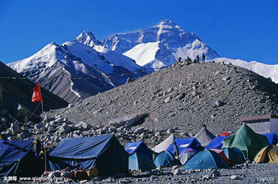 Day 11 (September 18, 2019):
Today the drive is about seven hours total.
Along the way, you'll cross two passes: Tsuo La (14,760 feet) and Lhakpa
La (17,121 feet). You'll visit a Tibetan village along the way, pass
farms and continue on to Chomolungma (Everest) National Park
headquarters. The gray, gold and red strips seen on many houses indicate
each family's devotion to the Sakya school of Tibetan Buddhism. Drive to
Everest Base Camp. Note: we'll sent up at Tibetan style tent at Tingri
overlooking the mountains where we can drink hot tea and
meditate. Overnight at Snow Leopard Guest House in Old Tingri (This is
the most basic "hotel" on our journey. Be prepared to rough it.)
(Breakfast, Lunch, Dinner)
Day 11 (September 18, 2019):
Today the drive is about seven hours total.
Along the way, you'll cross two passes: Tsuo La (14,760 feet) and Lhakpa
La (17,121 feet). You'll visit a Tibetan village along the way, pass
farms and continue on to Chomolungma (Everest) National Park
headquarters. The gray, gold and red strips seen on many houses indicate
each family's devotion to the Sakya school of Tibetan Buddhism. Drive to
Everest Base Camp. Note: we'll sent up at Tibetan style tent at Tingri
overlooking the mountains where we can drink hot tea and
meditate. Overnight at Snow Leopard Guest House in Old Tingri (This is
the most basic "hotel" on our journey. Be prepared to rough it.)
(Breakfast, Lunch, Dinner)
Day 12 (September 19, 2019):
Drive to Kyirong. Continue your
high-altitude road journey throughout the day to finally descend near
the Nepal border in about five hours. Drive steeply downhill to reach
Kyirong, at about 9000 ft. Hotel TBA. (Breakfast, Lunch, Dinner)

 Day 13 (September 20, 2019):
Borderlands. After breakfast, bid a fond
goodbye to your Tibetan guide and driver and begin Chinese immigration
formalities. Once complete, you will travel downhill to a bridge to
cross at Kyirong to the Nepal side of the border. (The old border
crossing at Zhangmu was closed after the Nepal earthquakes in 2015.)
Kyirong is a new border crossing which opened in 2017. You should arrive
in Nepal at about 10:00 AM, Nepal time. Here you will be welcomed by our
Nepal drivers and transferred by four-wheel drive vehicles to Kathmandu.
It's a rough but scenic five-hour drive as you pass many waterfalls,
valleys and lush fields along the way to Kathmandu. Overnight Hyatt
Regency Hotel in Kathmandu. Free time on arrival. (Breakfast, Lunch,
Dinner) Day 13 (September 20, 2019):
Borderlands. After breakfast, bid a fond
goodbye to your Tibetan guide and driver and begin Chinese immigration
formalities. Once complete, you will travel downhill to a bridge to
cross at Kyirong to the Nepal side of the border. (The old border
crossing at Zhangmu was closed after the Nepal earthquakes in 2015.)
Kyirong is a new border crossing which opened in 2017. You should arrive
in Nepal at about 10:00 AM, Nepal time. Here you will be welcomed by our
Nepal drivers and transferred by four-wheel drive vehicles to Kathmandu.
It's a rough but scenic five-hour drive as you pass many waterfalls,
valleys and lush fields along the way to Kathmandu. Overnight Hyatt
Regency Hotel in Kathmandu. Free time on arrival. (Breakfast, Lunch,
Dinner)
Day 14 (September 21, 2019):
Optional off the beaten track sightseeing
in and around Kathmandu. Final celebration dinner at the Hyatt.
(Breakfast, Dinner)
Day 15 (September 22, 2019):
Depending on your departure schedule, you
should have free time after breakfast then an on-time transfer to the
airport for your flight departing Kathmandu. (Breakfast)





Important Note:
This itinerary is only meant as a guide to the plan of
our trip. Changes can occur as we go and are based on local conditions,
acclimatization, health and fitness levels, etc. Times and elevations
noted here are all rounded off. Be aware that conditions in Tibet are
very rugged. Roads are unpaved and vehicle maintenance can be required
at any time. This will be an amazing experience if you are flexible and
can cope with occasionally rugged conditions. There can be abrupt
weather changes, rustic toilet facilities and exposure to the
elements. Tibet tourism is controlled by the Chinese government and is
completely subject to the authority of local tourism authorities.
Changes in their regulations may cause cancellations or rerouting.
Travel Details:
When arranging your flights to and from our Tibet travel
points, please note these dates and logistics: All participants must
arrive in Chengdu, China no later than September 8, 2019. You should not
depart Kathmandu earlier than September 22, 2019. Please ask any
questions before purchasing your international tickets. Flight times to
Chengdu will vary greatly based on your origin city as well as the
airline(s) being chosen. For some, air travel starting from the U.S.
could begin two days before the meeting date in Chengdu. Crossing the
International Date Line can make it seem as if you 'lose' a day flying
but on your return home, you may arrive on the same day, often just
hours later than the local time of your departure. You are welcome to
travel early or stay for extra days at the end. We can arrange
additional nights at any of our hotels or guest houses for you. Contact
us with your specific interests and budget - we can help make it happen!
Land Cost:
Includes All transfers by good vehicles with driver.
- English speaking guide as needed.
- Twin share room accommodation with
breakfast and any other meals mentioned in the itinerary.
- Entry fees
at monuments visited as part of the tour.
- Assistance as needed to be
provided by us and our agents in Nepal, China, and Tibet.
- All
applicable government taxes.
Land Cost Does Not include:
Any expenses of a personal nature such as
telephone, laundry, aerated drinks or bottled water, items ordered
through room service, mini bar etc.
- Meals apart from breakfast
included at the hotels or as specified in the itinerary.
- Camera fees
are not included in the cost.
- The cost incurred in obtaining the
required visas or travel insurance or in case of any hospitalization or
evacuation.
- Tip and gratuities paid to drivers, guides, bellboys etc
- Any airfares.
Cost & Registration Details:
Michael Gregory is making the final
determination about who can participate in the trip. Please check
with Davita Moodley by texting 831-234-5735 if you need clearance.
Land cost is dependent on group size which will be from 10-15 ($6495), 15-20 ($5995), 20-25 ($5495) participants.
The deadline for sign-up is June 9, 2018. Late sign-ups may be accepted
if there is space available, with a service charge of $100.
If you would prefer to have a private room you'll be charged a single
supplement of $1190-1055, depending on group size.
Early Registration Discount:
We'll offer a $200 discount to each person
who signs up and pays in full by April 8 (or a $100 discount for those
who sign-up with a $500 deposit by April 8 and pay for the trip
by the regular deadline of June 8, 2019).
Round-trip airfare to Chengdu and return from Kathmandu is estimated at
$1675 from Tampa (on Jet Blue and Cathay Pacific Airlines) and $1560
from Colorado (on United and Cathay Pacific Airlines) departing the U.S.
on the afternoon/evening of Friday, September 6th and returning early
afternoon on Monday, September 23.
One way Chengdu to Lhasa airfare on Tuesday, Sept. 10 estimated at $300
including service fee will be booked by us. Air China flight (CA4112)
departs Chengdu at 12:30 P.M. and arrives Lhasa at 2:55 P.M.
Payment for any added services during the trip may be required at the
time the service is received. Please refer to the "Our Policies" section
of this website or the booking information section of our application
form for more information.
|









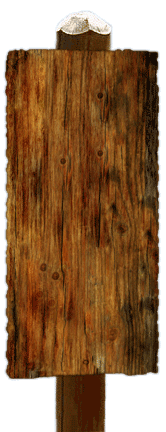

 Leadership: Michael Gregory
is the Director of Mindfulness Meditation
Centers throughout the US. He has led hundreds of meditation retreats on
almost every subject matter related to Dharma, in addition to leading
meditative pilgrimages throughout Thailand, Tibet, Bhutan, Nepal, and
India. Michael was ordained as a monk in the Thai Forest tradition, the
Burmese Mahasi tradition, and then was ordained in the Tibetan tradition
by H.E. Gylatsab Rinpoche at Rumtek monastery in Sikkim. He has
practiced in the Thai Forest tradition of Ajahn Chah, the Anapanasati
tradition of Buddhadassa Bhikku, and the Jhana traditions of Mahasi
Sayadaw and Pa Auk, as well as having extensive experience in the Tibetan
tradition.
Leadership: Michael Gregory
is the Director of Mindfulness Meditation
Centers throughout the US. He has led hundreds of meditation retreats on
almost every subject matter related to Dharma, in addition to leading
meditative pilgrimages throughout Thailand, Tibet, Bhutan, Nepal, and
India. Michael was ordained as a monk in the Thai Forest tradition, the
Burmese Mahasi tradition, and then was ordained in the Tibetan tradition
by H.E. Gylatsab Rinpoche at Rumtek monastery in Sikkim. He has
practiced in the Thai Forest tradition of Ajahn Chah, the Anapanasati
tradition of Buddhadassa Bhikku, and the Jhana traditions of Mahasi
Sayadaw and Pa Auk, as well as having extensive experience in the Tibetan
tradition.
 Tibet Guide: Pemba Tashi
is HHT's principal Tibetan trekking and
pilgrimage guide. His extensive mountain and trail experience combines
with his easy humor and an ability to help explain many complex cultural
and Buddhist-oriented subjects to travelers. He is an ideal interpreter
of this ancient and fascinating mountain region.
Tibet Guide: Pemba Tashi
is HHT's principal Tibetan trekking and
pilgrimage guide. His extensive mountain and trail experience combines
with his easy humor and an ability to help explain many complex cultural
and Buddhist-oriented subjects to travelers. He is an ideal interpreter
of this ancient and fascinating mountain region.
 Day 2 (September 9, 2019):
Following breakfast, enjoy a full day in
Chengdu. We first visit the world's largest park for the giant panda -
with more than 150 giant pandas. It is a 40-minute drive to reach the
park, located in the north side of the city. Enjoy two to three hours at
the center, strolling through its bamboo forest, with an early lunch at
a Sichuan hotpot restaurant.
Day 2 (September 9, 2019):
Following breakfast, enjoy a full day in
Chengdu. We first visit the world's largest park for the giant panda -
with more than 150 giant pandas. It is a 40-minute drive to reach the
park, located in the north side of the city. Enjoy two to three hours at
the center, strolling through its bamboo forest, with an early lunch at
a Sichuan hotpot restaurant. Day 5 (September 12, 2019):
After breakfast this morning, we will visit
Drepung Monastery (literally "Rice Heap" Monastery). Drepung is the
largest of all Tibetan monasteries and is located on the Gambo Utse
mountain, five kilometers from Lhasa. It was founded in 1416 by Jamyang
Choge Tashi Palden (1397-1449). It was known for the high standards of
its academic study and was called the Nalanda of Tibet, a reference to
the great Buddhist monastic university of India.
Day 5 (September 12, 2019):
After breakfast this morning, we will visit
Drepung Monastery (literally "Rice Heap" Monastery). Drepung is the
largest of all Tibetan monasteries and is located on the Gambo Utse
mountain, five kilometers from Lhasa. It was founded in 1416 by Jamyang
Choge Tashi Palden (1397-1449). It was known for the high standards of
its academic study and was called the Nalanda of Tibet, a reference to
the great Buddhist monastic university of India.
 Day 6 (September 13, 2019):
Today we explore Lhasa including the Jokhang
Temple and the majestic 13-story, 1,000-room Potala Palace. Tibetans, in
general, consider Jokhang Temple as the most sacred and important temple
in Tibet. Jokhang is run by the Gelug school, but worshipers from all
Buddhist sects visit the temple. The oldest part of the temple was built
in 652 by Songtsen Gampo. During the Cultural Revolution in 1966, Red
Guards attacked the Jokhang and for a decade there was no worship in
Tibetan monasteries. Renovation of the Jokhang began in 1972 and was
mostly complete by 1980. Its architectural style is a mixture of Indian,
Tibetan, and Nepalese design.
Day 6 (September 13, 2019):
Today we explore Lhasa including the Jokhang
Temple and the majestic 13-story, 1,000-room Potala Palace. Tibetans, in
general, consider Jokhang Temple as the most sacred and important temple
in Tibet. Jokhang is run by the Gelug school, but worshipers from all
Buddhist sects visit the temple. The oldest part of the temple was built
in 652 by Songtsen Gampo. During the Cultural Revolution in 1966, Red
Guards attacked the Jokhang and for a decade there was no worship in
Tibetan monasteries. Renovation of the Jokhang began in 1972 and was
mostly complete by 1980. Its architectural style is a mixture of Indian,
Tibetan, and Nepalese design.

 Day 7 (September 14, 2019):
Day trip to Drigung Thil (14, 649 feet)
about 75 miles north-east of Lhasa. Founded in 1179 traditionally
Drigung Thil Monastery was the main seat of the Drikung Kagyu tradition
of Tibetan Buddhism. The monastery was destroyed in 1959 but has been
partially rebuilt. Approximately 250 monks are in residence. Note: the
monastery can be visited for sure but the burial site cannot be
guaranteed as it depends on local permission. We will try our best to
include it. It is said that bodies dispatched here will not fall down
into the “ three bad regions." Drive back to Lhasa and overnight
Shangri-La Hotel (Breakfast, Lunch, Dinner)
Day 7 (September 14, 2019):
Day trip to Drigung Thil (14, 649 feet)
about 75 miles north-east of Lhasa. Founded in 1179 traditionally
Drigung Thil Monastery was the main seat of the Drikung Kagyu tradition
of Tibetan Buddhism. The monastery was destroyed in 1959 but has been
partially rebuilt. Approximately 250 monks are in residence. Note: the
monastery can be visited for sure but the burial site cannot be
guaranteed as it depends on local permission. We will try our best to
include it. It is said that bodies dispatched here will not fall down
into the “ three bad regions." Drive back to Lhasa and overnight
Shangri-La Hotel (Breakfast, Lunch, Dinner)

 Day 11 (September 18, 2019):
Today the drive is about seven hours total.
Along the way, you'll cross two passes: Tsuo La (14,760 feet) and Lhakpa
La (17,121 feet). You'll visit a Tibetan village along the way, pass
farms and continue on to Chomolungma (Everest) National Park
headquarters. The gray, gold and red strips seen on many houses indicate
each family's devotion to the Sakya school of Tibetan Buddhism. Drive to
Everest Base Camp. Note: we'll sent up at Tibetan style tent at Tingri
overlooking the mountains where we can drink hot tea and
meditate. Overnight at Snow Leopard Guest House in Old Tingri (This is
the most basic "hotel" on our journey. Be prepared to rough it.)
(Breakfast, Lunch, Dinner)
Day 11 (September 18, 2019):
Today the drive is about seven hours total.
Along the way, you'll cross two passes: Tsuo La (14,760 feet) and Lhakpa
La (17,121 feet). You'll visit a Tibetan village along the way, pass
farms and continue on to Chomolungma (Everest) National Park
headquarters. The gray, gold and red strips seen on many houses indicate
each family's devotion to the Sakya school of Tibetan Buddhism. Drive to
Everest Base Camp. Note: we'll sent up at Tibetan style tent at Tingri
overlooking the mountains where we can drink hot tea and
meditate. Overnight at Snow Leopard Guest House in Old Tingri (This is
the most basic "hotel" on our journey. Be prepared to rough it.)
(Breakfast, Lunch, Dinner)

 Day 13 (September 20, 2019):
Borderlands. After breakfast, bid a fond
goodbye to your Tibetan guide and driver and begin Chinese immigration
formalities. Once complete, you will travel downhill to a bridge to
cross at Kyirong to the Nepal side of the border. (The old border
crossing at Zhangmu was closed after the Nepal earthquakes in 2015.)
Kyirong is a new border crossing which opened in 2017. You should arrive
in Nepal at about 10:00 AM, Nepal time. Here you will be welcomed by our
Nepal drivers and transferred by four-wheel drive vehicles to Kathmandu.
It's a rough but scenic five-hour drive as you pass many waterfalls,
valleys and lush fields along the way to Kathmandu. Overnight Hyatt
Regency Hotel in Kathmandu. Free time on arrival. (Breakfast, Lunch,
Dinner)
Day 13 (September 20, 2019):
Borderlands. After breakfast, bid a fond
goodbye to your Tibetan guide and driver and begin Chinese immigration
formalities. Once complete, you will travel downhill to a bridge to
cross at Kyirong to the Nepal side of the border. (The old border
crossing at Zhangmu was closed after the Nepal earthquakes in 2015.)
Kyirong is a new border crossing which opened in 2017. You should arrive
in Nepal at about 10:00 AM, Nepal time. Here you will be welcomed by our
Nepal drivers and transferred by four-wheel drive vehicles to Kathmandu.
It's a rough but scenic five-hour drive as you pass many waterfalls,
valleys and lush fields along the way to Kathmandu. Overnight Hyatt
Regency Hotel in Kathmandu. Free time on arrival. (Breakfast, Lunch,
Dinner)
